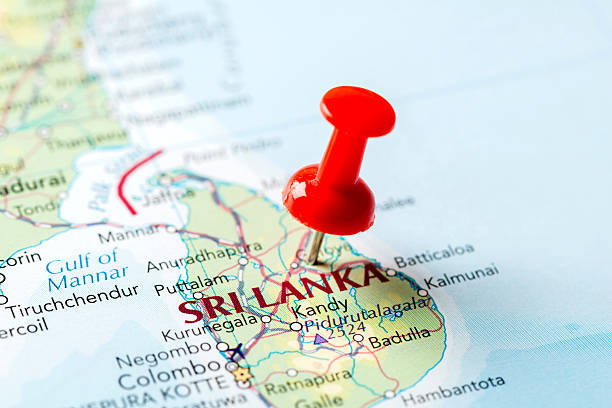News Highlight
India abstained from voting on a resolution on Sri Lanka at the UN Human Rights Council on Thursday.
Key Takeaway
- The Council adopted the resolution titled ‘Promoting reconciliation, accountability and human rights in Sri Lanka’ after 20 of its 47 members voted in its favour.
- While 20 countries abstained, seven — including China and Pakistan — voted against it, effectively backing the Sri Lankan government.
- The resolution called upon the Government of Sri Lanka to ensure the prompt, thorough and impartial investigation and prosecution of all alleged crimes relating to human rights violations.
India-Sri Lanka relations
- Political Relations:
- India is Sri Lanka’s closest neighbour. The relationship between the two countries is more than 2,500 years old, and both sides have built upon a legacy of intellectual, cultural, religious and linguistic interaction.
- Economic relations:
- India and Sri Lanka enjoy a robust trade and investment relationship. Sri Lanka is India’s largest trade partner in South Asia. India, in turn, is Sri Lanka’s largest trade partner globally.
- The Indo-Sri Lanka Free Trade Agreement (ISFTA) was signed in 1998 and entered into force in 2000.
- Multilateral interaction:
- India and Sri Lanka are members of Multilateral institutions, such as
- South Asian Association for Regional Cooperation (SAARC).
- Bay of Bengal Initiative for Multi-Sectoral Technical and Economic Cooperation (BIMSTEC).
- The Indian Ocean Rim Association (IORA).
- India and Sri Lanka are members of Multilateral institutions, such as
- Cultural relations:
- The Cultural Cooperation Agreement was signed by the Governments of India and Sri Lanka in 1977.
- India and Sri Lanka also commemorated the 2600th year of the attainment of enlightenment by Lord Buddha (Sambuddhatva Jayanthi) through joint activities.
- Defence relations:
- India-Sri Lanka Bilateral Exercise:
- Mitra Shakti (Army)
- SLINEX (Navy)
- Counter Drug and Human Trafficking agreement signed in 2019
- India-Sri Lanka Bilateral Exercise:
Importance of India- Sri Lanka relation
- Economic importance:
- India maintains a trade surplus with Sri Lanka, which shows the demand of Indian products in Sri Lankan markets.
- Sri Lankan tourists are among the top ten sources for the Indian tourism market.
- For example, India and Sri Lanka entered into an Open Sky Agreement to boost tourism.
- Strategic importance:
- The geographical location of Sri Lanka makes them the centre of India’s Security and Growth for All in the Region (SAGAR) vision.
- Both nations can effectively collaborate on piracy activities in the Palk bay and Gulf of Mannar region.
- Security importance:
- Easy to manage Disaster related issues due to proximity to India and also the Indian Navy.
- Both countries are the victim of Radical Terrorism and convergence of Intelligence sharing help both countries.
- Indosphere:
- Having good relations with Sri Lanka helps maintain the Indian influence in the region and thus benefits India geopolitically.
- Information fusion centre:
- Sri Lanka plays a vital role in India’s data gathering from the region and augmenting the capability of the fusion centre.
Issues and challenges
- Chinese Influence:
- Chinese Foreign direct investment (FDI) is the largest in Sri Lanka and they also seek to engage in port takeovers.
- For example, Hambantota Port was leased to China for 99 years.
- Historical Mistrust:
- Sri Lanka has a deep mistrust for India due to the regional support for Liberation Tigers of Tamil Eelam (LTTE) units during the civil war.
- 13th Amendment Issue:
- The 13th amendment states that Tamil will be one of Sri Lanka’s official languages and that provincial councils, with substantial authority, will be established throughout the country.
- India has been urging Sri Lanka to pass the 13th amendment in their constitution to create Tamil Provincial councils.
- Fishermen Issue:
- Sri Lankan navy frequently shoots and kills Indian fishermen for allegedly crossing into their territorial waters.
- Tamil Issues:
- Tamil Sri Lankans still do not have the same rights enjoyed by the Sinhalas.
- Katchatheevu Island:
- It is an uninhabited island that India ceded to Sri Lanka in 1974 based on a conditional agreement called “Katchatheevu island pact”.
- The central government recognises Sri Lanka’s sovereignty over the island as per the 1974 accord. But Tamil Nadu claimed that Katchatheevu falls under Indian territory.
United Nations Human Rights Council (UNHRC)
- About
- The Human Rights Council is an inter-governmental body within the United Nations system responsible for strengthening the promotion and protection of human rights worldwide.
- Formation:
- The Council was created by the United Nations General Assembly in 2006. It replaced the former United Nations Commission on Human Rights.
- Its is headquartered in Geneva, Switzerland.
- Members:
- It is made up of 47 United Nations Member States, which are elected by the UN General Assembly (UNGA).
- The membership of the Council is based on equitable geographical distribution.
- African States: 13 seats
- The Asia-Pacific States: 13 seats
- Latin American and Caribbean States: 8 seats
- Western European and other States: 7 seats
- The Eastern European States: 6 seats
- Functions:
- It is responsible for strengthening the promotion and protection of human rights worldwide.
- It also addresses and makes recommendations on situations of human rights violations.
- Funding:
- Almost two-thirds of UN Human Rights income comes from voluntary contributions from the Member States and other donors.
- The remainder is covered by the UN’s regular budget.
Pic Courtesy: iStock
Content Source: The Hindu



